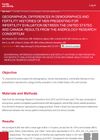 45 citations,
November 2021 in “Fertility and Sterility”
45 citations,
November 2021 in “Fertility and Sterility” The conclusion is that women under 35 should start fertility checks after 12 months of trying to conceive, women over 35 after 6 months, and women over 40 should start immediately. The checks should include ovulation status, reproductive tract structure, and male partner's semen evaluation.
 28 citations,
January 1991 in “Reproductive Toxicology”
28 citations,
January 1991 in “Reproductive Toxicology” Finasteride temporarily lowers male rat fertility without affecting libido.
 20 citations,
April 2012 in “Fertility and Sterility”
20 citations,
April 2012 in “Fertility and Sterility” Finasteride causes lasting fertility decrease in rats.
 9 citations,
October 2017 in “Translational pediatrics”
9 citations,
October 2017 in “Translational pediatrics” Pediatric endocrinologists should provide early fertility counseling and preservation options to young patients at risk of infertility.
 8 citations,
January 2017 in “Fertility and Sterility”
8 citations,
January 2017 in “Fertility and Sterility” Urologic diseases and treatments in older men can negatively affect fertility, and doctors should talk to patients about this.
 3 citations,
February 2018 in “Human Reproduction”
3 citations,
February 2018 in “Human Reproduction” A man with testotoxicosis was fertile despite low FSH levels, suggesting high testosterone may allow sperm production without FSH.
 1 citations,
September 2021 in “Fertility and Sterility”
1 citations,
September 2021 in “Fertility and Sterility” American men seeking infertility evaluation are generally older, more obese, have longer infertility duration, and different lifestyle habits compared to Canadian men.
 September 2021 in “Fertility and Sterility”
September 2021 in “Fertility and Sterility” Older men have different fertility histories and factors affecting fertility, suggesting they may benefit from earlier fertility evaluations.
 January 2015 in “International journal of reproduction, contraception, obstetrics and gynecology”
January 2015 in “International journal of reproduction, contraception, obstetrics and gynecology” Women with PCOS often have irregular periods, a higher chance of infertility and miscarriages, and may improve fertility with lifestyle changes and treatment.
 March 2014 in “Fertility and Sterility”
March 2014 in “Fertility and Sterility” The April 2014 issue of "Fertility and Sterility" discussed various reproductive health topics, including hormone therapy benefits, sperm and genetic factors in male infertility, and the link between PCOS and diabetes.
 37 citations,
January 1991 in “Reproductive Toxicology”
37 citations,
January 1991 in “Reproductive Toxicology” Finasteride reduces male rat fertility by causing issues with copulatory plug formation.
 17 citations,
May 2021 in “Journal of Assisted Reproduction and Genetics”
17 citations,
May 2021 in “Journal of Assisted Reproduction and Genetics” COVID-19 may harm male fertility and damage the reproductive system.
15 citations,
March 2015 in “PloS one” Scientists restored fertility in male mice lacking a key fertility gene by using a modified gene.
 12 citations,
June 2016 in “Reviews in Endocrine and Metabolic Disorders”
12 citations,
June 2016 in “Reviews in Endocrine and Metabolic Disorders” Some skin diseases and their treatments can negatively affect male fertility.
 June 2023 in “Medicine and Pharmacy Reports”
June 2023 in “Medicine and Pharmacy Reports” A woman with a specific mutation causing adrenal gland issues faced fertility problems, but careful hormone therapy helped her manage it successfully.
 88 citations,
May 2012 in “Human Reproduction Update”
88 citations,
May 2012 in “Human Reproduction Update” Women with PCOS may take longer to get pregnant but can have a normal family size, and should manage their overall health to reduce long-term health risks.
 53 citations,
February 2022 in “The Journal of clinical endocrinology and metabolism/Journal of clinical endocrinology & metabolism”
53 citations,
February 2022 in “The Journal of clinical endocrinology and metabolism/Journal of clinical endocrinology & metabolism” AMH helps estimate ovarian reserve but doesn't predict pregnancy chances; age is more important.
 20 citations,
January 2016 in “Open Journal of Endocrine and Metabolic Diseases”
20 citations,
January 2016 in “Open Journal of Endocrine and Metabolic Diseases” PCOS affects fertility and is linked to obesity and menstrual irregularities; lifestyle changes are recommended for treatment.
5 citations,
January 2018 in “Research Journal of Pharmacy and Technology” Finasteride significantly reduces fertility in male rats.
 5 citations,
December 2012 in “PubMed”
5 citations,
December 2012 in “PubMed” Stopping the use of the drug finasteride can improve sperm count and does not prevent normal conception, but caution is advised when trying to conceive.
2 citations,
April 2022 in “Annales d Endocrinologie” Recombinant gonadotropins improve future fertility in CHH patients.
 1 citations,
May 2011 in “Journal of Human Reproductive Sciences”
1 citations,
May 2011 in “Journal of Human Reproductive Sciences” Finasteride may decrease semen quality but not harm sperm production, and stopping the drug can improve semen quality; hyperprolactinemia can cause infertility but is treatable with medication.
 January 2019 in “Open Access Journal of Nursing”
January 2019 in “Open Access Journal of Nursing” Thai women with PCOS become more aware and change their lifestyle to manage their fertility and symptoms.
 77 citations,
June 2015 in “Nature Reviews Urology”
77 citations,
June 2015 in “Nature Reviews Urology” Some common medications can harm male fertility, but many effects can be reversed.
 70 citations,
April 2013 in “Endocrine”
70 citations,
April 2013 in “Endocrine” Lifestyle changes improve metabolism and fertility in overweight PCOS patients; anti-obesity drugs show potential but need more research.
 55 citations,
July 2013 in “Dermatologic therapy”
55 citations,
July 2013 in “Dermatologic therapy” Some dermatological medications can impair male fertility, so consult a doctor before trying to conceive.
 35 citations,
October 2004 in “Biology of Reproduction”
35 citations,
October 2004 in “Biology of Reproduction” PNU157706 reduced rat sperm movement and fertility without affecting offspring health.
 1 citations,
July 2023 in “F&S Reviews”
1 citations,
July 2023 in “F&S Reviews” Some common medications may harm male fertility by affecting hormones, sperm production, and sexual function.
 October 2024 in “Andrology”
October 2024 in “Andrology” Paternal drug exposure can harm fertility, pregnancy outcomes, and offspring health, with specific drugs linked to various reproductive issues.
January 2005 in “Elsevier eBooks” Insulin resistance and hyperinsulinism are linked to fertility issues and can worsen symptoms of PCOS.

























